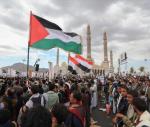You are here
Sisi’s victory may not be that easy
May 06,2014 - Last updated at May 06,2014
The race to the presidential palace in Egypt has officially kicked off this week with only two candidates in the race: Former defence minister Abdel Fattah Al Sisi, considered by most as the favourite, and underdog veteran politician for more than 40 years, Hamdeen Sabahi.
There are stark differences between the two men and each represents certain interests in a country that has witnessed two popular uprisings in the space of three years and is increasingly polarised.
The presidential election, slated for the end of this month, is an essential component of the roadmap for the future which Sisi unveiled on the eve of toppling the country’s Islamist president, Mohamed Morsi.
Sisi’s plan, supported by the majority of Egyptians, included the adoption of a new constitution, approved earlier this year, and the holding of presidential and legislative elections, thus ending a one-year transitional phase.
Although Sisi said he was not seeking the presidency, popular pressure and the interests of the military, which plays a fundamental role in Egyptian politics, have changed all that.
In a carefully orchestrated set-up Sisi’s candidacy was seen as a major victory for the June 30 popular movement, which upset Morsi, and the political powers that supported it.
Sisi is considered a national hero and a saviour of Egyptians from the notorious rule of the Muslim Brotherhood. He has the support of the mainstream media, the army and most of the political powers, including the liberal Al Wafd and the Salafist Al Nour parties.
Opinion polls suggest that he would win a decisive 70 per cent of the votes in the first round. But while his victory is almost certain, there are some factors that could turn this into a real contest.
One: Sabahi has the endorsement of many young Egyptians who played a central role in the January 25 revolution against former president Hosni Mubarak.
Sabahi was present in Al Tahrir Square from the very beginning and his candidacy is regarded as a true extension of that revolution.
Many of the leaders of youth movements that participated in the revolution were arrested, put on trial and sentenced by the transitional government. The April 6 movement has recently been banned by the courts.
On the other hand, Sisi also has the support of young Egyptians, especially the Tamarud movement, which was instrumental in organising the June 30 anti-Morsi campaign.
But Sabahi could still mobilise Egypt’s young who are fearful that Sisi’s victory could spell the end of the revolution’s objectives and exonerate Mubarak-era figures.
Two: Many of the figures associated with the Mubarak era have endorsed Sisi; observers believe this will hurt his campaign.
Even Mubarak is said to support Sisi and there is a perception that the alliance between the military and influential businessmen who ruled the country in the past 30 years will make a comeback under Sisi.
Three: No one really knows how the silent majority, or the so-called Al Kanaba (couch) Party, will react in the coming election.
It was this large group of Egyptians that took to the streets during the January 25 and June 30 uprisings, but when it came to voting for the new constitution, most stayed home.
The position of millions of Egyptians, who are usually apathetic, will play a major role in the coming election.
Four: While the position of the anti-coup alliance of mostly Islamist groups and parties is to boycott the election, there is the possibility that Muslim Brotherhood followers and supporters may decide to vote for Sabahi.
Although Sisi and Sabahi have made no conciliatory gestures towards the Muslim Brotherhood, there is a perception that the socialist candidate will try to mend fences with the Islamists.
He is calling for justice that will bring anyone who had committed crimes against the Egyptian people to justice. And since the Salafists decided to vote for Sisi, it is possible that the Muslim Brotherhood and their allies will go the other way.
Five: Sabahi will use the fact that his rival cannot appear in public rallies across the country, for security reasons, to his benefit.
He has nothing to fear and his campaign will be closer to the people than Sisi’s.
In contrast to Sabahi’s popular image as a fiery orator, Sisi is soft spoken and reserved. So far, his campaign has centred on giving press interviews. But he will have to appear in public soon and address his supporters if he is to give credence to his image as a tough and determined leader.
In spite of all these factors Sisi remains the favourite to win the coming election. But it might not be the easy victory that his supporters, and the media, think.
Sabahi’s election programme has been criticised as too ambitious and unrealistic.
Sisi will reveal his own programme soon. He has already said that he cannot promise much and that change will take time. This is not exactly what millions of Egyptians want to hear.
The writer is a journalist and political commentator based in Amman.













